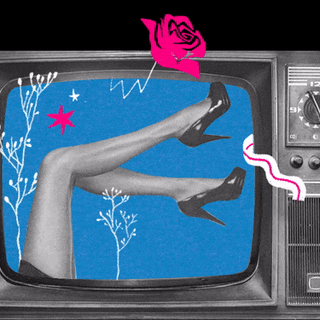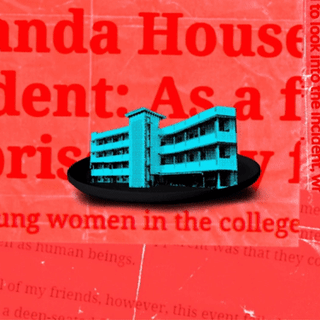
In Conversation: On the Fight to Legalize Same‑Sex Marriages
The team discusses pressing events that say something about our culture, and why it matters. Today, we talk about queer rights, the state, and the complexities of legally recognizing marriage for queer couples.

The team discusses pressing events that say something about our culture, and why it matters. Today, we talk about queer rights, the state, and the complexities of legally recognizing marriage for queer couples.
Last week, a two-judge Bench in the Supreme Court, headed by CJI D.Y. Chandrachud, issued notice to the Union Government regarding a petition that sought recognition of same-sex marriages in the country. The petition, filed by a gay couple, drew on previous judgments — including the one that affirmed the right to privacy as a fundamental right, and the one that decriminalized Section 377 of the Indian Penal Code.
The couple also claimed that they had been together for several years, and had been raising two children together as well. Due to the law, however, they can’t have a legal relationship as parents to their children — nor can they solemnize their union legally.
The petition is a sign of hope. Gay marriage remains one of the key issues in the queer rights discourse in India — but it’s also a fraught one. For one, marriage is an inherently unfeminist, heteronormative institution. Can legalizing gay marriage change this foundation, or strengthen it?
*
DR: I’ve long been unsure of how to feel about the legalization of same-sex marriages. On the one hand, it’ll allow people, irrespective of their sexual orientation, to be joined in matrimony, which we’ve been conditioned to perceive as the ultimate celebration of love. On the other hand, given that marriage is a heteronormative construct designed to serve patriarchy, I’m forced to wonder whether it is at all a good idea to bring same-sex relationships within its regressive ambit.
One way to bridge this conflict, perhaps, is to rethink the institution of marriage itself — moving away from stereotypical gender roles, patriarchy, and heteronormativity, to focus, instead, on equity and love. It certainly seems like a better idea than denying same-sex couples the very option of being hitched to their partners. Rewriting the norms, however, isn’t going to be an easy, quick process. The good news, though, is that change is already underway — many younger Indian heterosexual couples, too, have begun feeling disillusioned with marriages; some of them are tying the knot simply for tax benefits, ease of traveling and relocation, and, of course, the convenience of housing that society affords married heterosexual couples, as opposed to the unmarried ones. Perhaps, it is this disillusionment that prompts several couples, even if they follow the same religion, to register their union under the Special Marriage Act of 1954 since personal laws can often make religious ceremonies mandatory.
Legalizing same-sex marriages, then, can prompt the large-scale rethink of marriage that’s long overdue in India. By disrupting the heteronormative framework of the institution, same-sex marriages might force legislators to rethink dowry, inheritance, and adoption, among other things — hopefully, paving the path for broader, inspired public debates that successfully subvert what a marriage looks like. That’s the kind of ripple effect that can, one hopes, steer the institution of marriage in India into the 2020s.
Related on The Swaddle:
Survey Suggests Some Gay Men in Heterosexual Marriages Are Considering Coming Out, Post‑377
RN: The idea of “same-sex” marriages runs into a major stumbling block at the very first instance — what is sex? Will trans men get to marry cis men? Will non-binary people be allowed to marry on their own terms at all? As Dr. Aqsa Shaikh pointed out in a tweet thread, trans women aren’t even considered equal to cis women by law. This is evidenced by the provision that levies a lesser sentence for the rape of trans women as compared to cis women. Trans people are also excluded from adoption, assisted reproductive technology, and their legal invisibility even excludes them from accessing social security and financial services like banking. The legal bureaucracy, moreover, still assigns trans people to the “other” or “third gender” categories. When there’s no equality even within gender and all its identities, marriage then seems like another prospect that, while liberating some, entrenches others deeper into institutional violence.
Queer critiques of marriage have noted that focusing on acquiring the rights that heterosexual couples enjoy misses a larger issue: that it isn’t equitable or fair that marriage bestows certain privileges to some over others. The feminist critique of marriage further adds to this — marriage is a tool that helps the state regulate individuals through their family lives. It’s an institution that upholds some of our most exclusionary and structurally oppressive norms: such as patriarchy, compulsory monogamy, and heteronormativity, and is further designed to keep women in the private sphere, performing unpaid and underpaid care labor. When they enter the fold of marriage, even queer relationships may arguably be forced to mimic heterosexual structures — where one partner performs feminized labor, and one is the conduit for inheriting property, titles, and resources. How equitable can marriage get, under these circumstances?
AS: It is understandable that queer couples organize around marriage as a way of sanctioning their own way of organizing a family. But the petition for (cis) gay marriages to be included under the Special Marriages Act contains some blindspots. The Special Marriages Act is intended to facilitate civil marriages between people of any religion or caste. However, the Act is infamous for making it, in fact, more difficult for actual interfaith and intercaste couples to get married on their own terms. Its provisions mandate that couples make every aspect of their identity — including their addresses and photographs — public, and it then allows anyone from anywhere gets the state to oppose the marriage if they object to it within a 30-day notice. It might be easy for a couple coming from a position of privilege and family acceptance to get married under this Act — but what about those fleeing their oppressive households, or queer inter-caste, inter-faith couples? It would also, then, arguably force queer individuals to compulsorily come out to their families if they want to get married — thereby paradoxically undermining the right to self-determination and privacy that the petition seeks.
Clubbing same-sex marriages with interfaith and intercaste marriages under the Special Marriages Act also raises a different set of questions. Marriages are caste-based, religion-based contracts that uphold the segregation of societies based on these lines. Inter-faith or inter-caste marriages, then, break from rigid and restrictive structures of caste and religion. Can a gay marriage between partners from the same caste and religion — who may have a wedding replete with traditional rituals, upholding their caste and religious pride and purity — be equated with an inter-faith or inter-caste queer couple challenging those very institutions?
Related


The Media Is Oversexed. Accurate Asexual Representation Can Fix That
